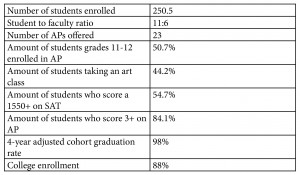By Isabel Tabs ’17

It’s no surprise West Essex offers students an elite educational experience. With sending kids to some of the best colleges nationwide, West Essex evidently has formed a solid foundation for a prestigious academic program. However, over the past six years, West Essex’s ranking among the New Jersey’s Top Public Schools published by New Jersey Monthly this past September has unfortunately plummeted, dropping to spot 55.
The ranking previous to this year’s was in 2014 and West Essex claimed spot 25. In 2012, West Essex was ranked 16 in the state coming from 36 in 2010. Since 2012, West Essex failed to get the better recognition for its academics, falling back down to spot 25. Based on the recent history of West Essex’s placement among New Jersey’s Top Public Schools, the implication could be that our district is “just average.” But this number or label doesn’t adequately reflect the exceptional educational values West Essex instill in its students. Moreover, there is an inherent absurdity regarding the ranking system for school districts as it is completely flawed. How far can you boil down the quality of education a high school provides to just a few statistics?
There are preconceived notions revolving around testing and its importance because people incessantly talk about the subject. It’s become this sort of “culture” that encourages more competition between us, but students should know that West Essex prepares us beyond a standardized tests.
“Our teachers and administrators create dynamic learning experiences designed teach students how to think critically and work collaboratively to identify problems and come up with solutions,” English Supervisor Ms. Casais said. “These skills will help students do well on standardized tests, but more importantly, they will prepare students for college, the workforce, and life.”
The rankings come out every two years by using data from the graduating senior class of the previous year. The methodology behind it all is relatively simple: The categories and indicators for the ratings were based off of the school environment, which includes the amount of rigorous courses such as Advanced Placement (AP) courses and the number of students taking a visual art, students’ performance on SATs and APs, and student outcomes including graduation rates.
Some of West Essex’s notable statistics from 2016: 50 percent of all juniors and seniors were enrolled in at least one AP class, and more than 84 percent of them scored a passing grade of 3 or higher. 45 percent of the students were taking an art class, 55 percent of the class of 2015 got a 1550 or higher on SAT and the class had a graduation rate of 98 percent.
Using such a simple method cannot and should not measure the relative qualities in schools. National tests as well as how any AP courses school offers should not be the bedrock of the ranking system. It seems that this culture of test taking is seemingly still a topic up for debate and how it cannot only affect people, but a whole school system. From an economic standpoint, AP exams cost money, so not every family can afford it. There could be a significant percentage of students that are smart and would have done well on the exam, but because they are so costly they were unable to take them.
Additionally, students who have access to personal tutors and courses for ACTs and SATs normally have an advantage over those who don’t use these sources. People who are at a financial disadvantage cannot afford these tutors and this may result in poor testing scores. There are also a large group of students who arn’t good test takers.
“People’s test scores should not determine their ranking,” sophomore Ellie Decker said “No school or individual should be judged based on a number.”
Because the ranking is exclusive to purely academics, factors like this may disrupt the results evidently making them inaccurate. In fact, there are many criticisms people lodge against AP courses: They overpower the other indicators that make a good quality school. It seems like today, students are driving College Board’s revenue instead of receiving a genuine educational benefit from these tests.
So yes, recent West Essex students might have not been doing as well on standardized tests from previous years, but the school is made up of a faculty that genuinely cares about their students by devoting their time and attention to the success of the kids.Test scores have the ability to evaluate some of students’ level of intelligence, but they are definitely not a measure of character. A current study done by the National Center for Fair and Open Testing showed that ACT and SAT scores are not an accurate predictor of student success in college.
“West Essex is filled with hard-working individuals from the students to the faculty and administrators to the custodial staff who all care about one another and take pride in this district,” Ms. Casais said. “Nobody can put a number on that.”
There is no given degree of accuracy with rankings, which is why students shouldn’t feel ashamed of their school’s reputation. E Maybe this sparks motivation in students to study more and give West Essex the esteem it deserves. However, students, faculty and administrations know that, West Essex only intends to promote a positive learning experience.


